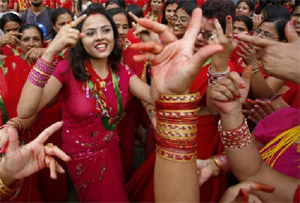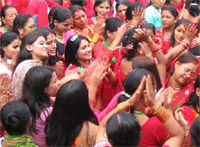- Home |
- Why With Us |
- About Us |
- Booking |
- Contact Us |
- Site Map
- Home
-
Nepal
-
Trekking
- Arun Valley with Gokyo Lakes
- Everest Base Camp Trek
- Everest- A Living Culture Exploration
- Everest Explore
- Everest Base Camp (via Thame) Trek
- Everest Base Camp with Kala Patthar
- Everest Comfort Trek
- Everest High Passes with Ama Dablam Base Camp
- Everest Mani Rimdu Festival Trek
- Everest Nagpa La Trek
- Everest with three high passes
- Gokyo Ri, Chola Pass & Chukung Ri with Kala Patthar
- Gokyo with Everest Base Camp
- Jomsom - Muktinath
- Jomsom - Muktinath
- Khayar Lake Trek
- Manaslu and Tsum Valley with Larkya La
- Upper Mustang Trek
- Manaslu High Circuit
- Manaslu, Tilicho Pass & Upper Mustang
- Annapurna Base Camp Trek
- The Annapurna Circuit Trek
- Annapurna Panorama
- Nar and Phu Valley Trekking
- Nepal Rhododendron Trek
- Royal Trek
- Saribung Trek and Expedition
- Annapurna Sanctuary Trek
- The Annapurna Sunrise Trek
- Expedition
-
Rafting
-
Peak Climbing
-
Tours
- Kathmandu-Chitwan-Jungle Tour with visit to Pokhara
- Dawn to Dusk Tour
- Historical, Natural & Cultural Tour with Camping
- Kathmandu Valley Temple Tour
- Temple - Panorama - Jungle Tour
- Taste of Nepal
- Central Nepal Tour
- Explore Nepal Tour & Trek
- Nepal Cross-country Tour
- Best of Nepal Tour & Treks
- Kathmandu valley rim Tour & Treks
- Nepal Culture Tour
- Introduction to Nepal Tour & Treks
- Nepal at a glance Tour & Treks
- Wonders of Nepal Tour & Treks
- Glimpses of Nepal Tour & Treks
- Through the Silhouette Tour & Treks
- Tent and Temple Tour
- Kathmandu-Chitwan-Pokhara Tour
- Historical, Cultural City and Jungle Tour
- Nepal Wildlife Tour
- Nepal Panorama Historical Tour
- Nepal Adventure Tour
- Nepal Pilgrimage Tour
- Ghalegaun-Ghanapokhara Homestay Tour
- Jungle Safari
- Adventure Sports
-
Trekking
- Tibet
-
Bhutan
-
India
- Yoga Tour
- About Us
-
The Great Himalayan Trail
-
Short Tours/Treks

Teej and Rishi Panchani
 Teej or Haritalika is purely a women's festival. Celebrated for marital bliss, well being of spouse and children and purification of own body, this three day festival follows in close succession and is also the time for observing religious fast for women folks in Nepal. It is also celebrated to welcome the arrival of monsoon session in the country after a season of oppressive heat. On the day of Teej all the women observe fasting for twenty-four hours for the longevity of their husbands' life and go to visit the shrine of Pashupatinath and offer worship to Lord Shiva and his consort Parvati later in the evening.
Teej or Haritalika is purely a women's festival. Celebrated for marital bliss, well being of spouse and children and purification of own body, this three day festival follows in close succession and is also the time for observing religious fast for women folks in Nepal. It is also celebrated to welcome the arrival of monsoon session in the country after a season of oppressive heat. On the day of Teej all the women observe fasting for twenty-four hours for the longevity of their husbands' life and go to visit the shrine of Pashupatinath and offer worship to Lord Shiva and his consort Parvati later in the evening.
 Unmarried girls also observe fast on this day and wish for a happy and prosperous married life. The first day of Teej is called the "Dar Khane Din". On this day the women, both married and unmarried assemble at one place, in their finest attires and start dancing and singing devotional songs. Amidst all this, the grand feast takes place. The jollity often goes on till midnight, after which the 24 - hour fast starts the third and the concluding day of the festival is known as Rishi Panchami which is mainly devoted to cleaning the body by taking ritual bath in rivers for getting rid of any sin or impurity the women folks may have committed during the past Year. On this day women worship the seven Rishis. The Panchami is mainly devoted to cleaning the body by taking ritual bath in rivers for any sin or impurity the women folks may have committed during the past year. On this day women worship the seven Rishis in reminiscence of a high ascetic tradition of Hinduism and a notion of purity of descent in their lineage from the ancestral Rishis. After the completion of the previous day's Puja, women pay homage to various deities and bathe with red mud found on the roots of the sacred datiwan (brush) taken out from the Neem tree (Neem -Azadirachta indica, is a tree in the mahogany family Meliaceae. It is one of two species in the genus Azadirachta, and is native to Nepal, India, Myanmar, Bangladesh and Sri Lanka; along with its leaves solely for the purpose of bodily purification which in turn is believed to purify the human spirit as well. This act of purification is the final ritual of Teej, after which women are considered absolved from all sins. All women whose husbands are alive are seen wearing red garments invariable and decked in all sorts of jewellery on these two days. The whole Kingdom turns into a colourful carnival on this particular day of Teej festivities.
Unmarried girls also observe fast on this day and wish for a happy and prosperous married life. The first day of Teej is called the "Dar Khane Din". On this day the women, both married and unmarried assemble at one place, in their finest attires and start dancing and singing devotional songs. Amidst all this, the grand feast takes place. The jollity often goes on till midnight, after which the 24 - hour fast starts the third and the concluding day of the festival is known as Rishi Panchami which is mainly devoted to cleaning the body by taking ritual bath in rivers for getting rid of any sin or impurity the women folks may have committed during the past Year. On this day women worship the seven Rishis. The Panchami is mainly devoted to cleaning the body by taking ritual bath in rivers for any sin or impurity the women folks may have committed during the past year. On this day women worship the seven Rishis in reminiscence of a high ascetic tradition of Hinduism and a notion of purity of descent in their lineage from the ancestral Rishis. After the completion of the previous day's Puja, women pay homage to various deities and bathe with red mud found on the roots of the sacred datiwan (brush) taken out from the Neem tree (Neem -Azadirachta indica, is a tree in the mahogany family Meliaceae. It is one of two species in the genus Azadirachta, and is native to Nepal, India, Myanmar, Bangladesh and Sri Lanka; along with its leaves solely for the purpose of bodily purification which in turn is believed to purify the human spirit as well. This act of purification is the final ritual of Teej, after which women are considered absolved from all sins. All women whose husbands are alive are seen wearing red garments invariable and decked in all sorts of jewellery on these two days. The whole Kingdom turns into a colourful carnival on this particular day of Teej festivities.

- History
- Overview
- Ancient Nepal
- The Early Kingdom of the Licchavis
- Medieval Nepal, 750-1750
- The Malla Kings
- The Three Kingdoms
- The Making of Modern Nepal
- The Struggle for Power
- The Enclosing of Nepal
- Infighting among Aristocratic Factions
- Rana Rule
- The Ranas
- The Growth of Political Parties
- The Return of the King
- The Democratic Experiment
- The Panchayat System under King Mahendra
- King Birendra
- Movement to restore democracy
- Maoist Insurgency
- Struggle for Democracy
- King's Direct Rule
- People's Movement
- The Constitutional Assembly Election
- Government and Political Conditions
- Geography
- Festivals of Nepal
- Overview
- Bada Dashain (September-October)
- Sri Panchami or Basanta Panchami
- Tihar and Laxmi Puja - festival of lights (Oct-Nov)
- Maghe Sankranti
- Naga Panchami
- Janai Poornima (Rokshya Bandhon)
- Gaijatra
- Pancha Dan
- Teej and Rishi Panchani
- Indrajatra
- Ghanta Karna
- Buddha Jayanti
- Maha Shivaratri
- Phagu Poornima or Holy
- Ghode Jatra
- Chaite Dashain
- Nava Varsha / New Year
- Festival of Seto Machhendranath
- Matatirtha Aunsi or Mother\'s Day
- Bala Chaturdashi
- Sri Krishna Janmastami
- Rama Nawami
- Mani Rimdu festival - Everest Region
- Tiji Festival, Mustang
- Dumje Festival - Everest Region
- Flora and Fauna of Nepal
- Flowering Plants of Nepal
- Getting in to Nepal
- Climate
- Nepal Visa Procedures
- Nepalese Embassies and Consulates Abroad
- Places visit in Nepal
- Orchids of Nepal
- World Heritage Sites of Nepal
Trekking in Nepal
Expeditions In Nepal
Rafting in Nepal
Tours in Nepal
All rights reserved.



